Tuesday, 22 June 2010
Book (Fiction) - A Dark Matter, Peter Straub.
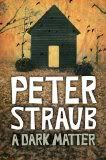 |
| Buy On Amazon UK |
Peter Straub writes about a ritual in a meadow one evening in the 60s, during which four high school friends share a different perspective on the same occult happening that affects them deeply for the rest of their lives. Years later, the husband of one of the participants, Lee Harwood, decides to piece together those same events from the viewpoints of the parties concerned. In fact, Harwood belonged to that same high school bunch, but failed to be drawn by the instigator of their apocalyptic experience, ageing campus guru Spencer Mallon. He has always wondered about that day, knowing the others have a bond as a result that he isn't privy to, but also aware that were some dire consequences, resulting in the death of one of their number and lifelong internment in a mental facility for another. This subliminal questing is brought into focus, years later, by an encounter with a raving man in a diner, who reminds him of the one who didn't fare too well from his experience.
The principal characters have no weaknesses of construction, they are as whole and hale as he crafts them. As always with Straub, less is generally more, except perhaps in the case of Spencer Mallon, that purveyor of cod philosophy - "everything is everything", and shabby necromancy. His Svengali-like hold over the impressionable students does not invite unbelief, but his later propensity to dally through layers of time and space at will, concocting Lost type challenges for hapless followers in search of truths does, a little. Mallon, in the way of superhero villains, is over-powered, threatening the credibility of the otherwise elaborate small-townness of Straub's world.
Straub, it seems, became conscious of this, and also the need to allow the intended viewpoints (of the now-grown students) to flower and so prunes back Mallon's latter-day character, confining him largely to hints and half-glimpses and reported speech, with one physical airport appearance (to warn Harwood of an impending disaster).
But this clunky watering down leaves the unlikeable Mallon stranded two-dimensionally in the current world. Brimming with inarguable potency, yet too far removed from the consequences of the story. It's a tricky balance that Straub marginally struggles with in the late stage pregnancy of the story's often painful birth.
So the narrative works best when these grown-up folk struggle to reconcile what happened to them that long-ago day, encouraged by Lee Harwell's gentle probing. Having said that, this isn't a leap out, scream-in-the-dark horror parable in the way of King or Herbert. Straub doesn't write that way, he builds a sense of strangeness in the inanimate, almost inviting you to wander through scenes of the everyday and point out things that mightn't look quite right. That mightn't be what they seem. All without judgement or inference, and with that shrewd air of "we're just going here, to take a look. Come along if you want."
Unusually though, for someone so effortless in the art of story, the first fifty pages were fairly hard going, as though the author had struggled through several drafts to try and make his world stick, and had deemed this the best it was going to get. After that, though, Straub's laconic style soon kicks into stride, economy and turn of phrase dictating a smoothly deceptive pace and level of engagement common to all his works.
In summary, this isn't his absolute best. It falters at times and wanders into areas of dislocation at others, but it still offers that same sleepy warmth of a long, disturbing daydream in a summer meadow.
Rating: 3 stars out of 5
Thursday, 10 June 2010
Book (Fiction) - A Life of Pi. Yann Martel
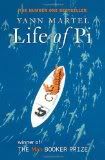 |
| Buy From Amazon. |
Rating: 4 stars out of 5.
This is Yann Martel's second novel, which concerns a young Indian boy's ordeal of 227 days aboard a lifeboat, with just a 450-pound Bengal tiger for company.
In its deepest essence, Life of Pi seeks to tell a story. Whether tall tale or epic survivalist journey is up to you to decide. At its conclusion, Martel will actually challenge you to do so. But because story is at its focus and telling it is the point, the metaphysical stuff, the allegorical matter, the Zoo parable, the magic realism slinks moodily alongside, like that striped carnivore behind the mind's own high fence. It probably defies outright categorisation for this reason, albeit it not sufficiently enough to prevent it from winning the Man Booker prize in 2002.
The tale follows the struggle of bookish, dreamy Piscine Patel, who truncates his own name to Pi. There are good reasons for this, and they come from early school taunts like 'Pissing' Patel,. In deflecting this routine mockery by aligning himself with that mathematical constant, Martel illustrates his protagonist's cunning.
And so, in that Greek letter that looks like a shack with a corrugated tin roof, in that elusive, irrational number with which scientists try to understand the universe, I found refuge.Similarly, in his embracing of Islam, Christianity and Hinduism, with visits to all three purveyors of those sideshows, Martel demonstrates Pi's objectivism. Not that he is some sage, spiritual everyman; merely that he finds different attractions in all three. This marks out some of the adolescent naivete that will plot his course on a bobbing vessel in the vast Pacific ocean. He doesn't quite grasp the human need to adopt a position, be it football team, politics or religion, and cling to it no matter what, and it is potentially this investment in the possible that will ultimately save him. When a chance meeting of those three belief systems meet, in the market place, with his parents present, the sparks that fly are surprising to him.
"What it comes down to," the priest put out with cool rage, "is whether Piscine wants real religion or - myths from a cartoon strip."
"Gods - or idols," intoned the imam gravely.
"Our gods - or colonial gods," hissed the pandit.
It was hard to tell whose face was more inflamed. It looked as if they might come to blows.
So you understand the build-up to characterise Pi Patel as a recessive tool of whimsy is necessary for the suspension of disbelief that follows. And it's a big suspension, a huge disbelief.
Nonetheless, the facts are catered for, to soften us. Pi's father ran a zoo in Pondicherry, so Pi has experience with animals, or perhaps more importantly, the psychology of animals. Or perhaps crucially, the psychology of animals in captivity. If this lets you believe this boy can share a narrow space (twenty-six feet, from bow to stern to be exact) with a tiger called Richard Parker, then the job is done. The belief that people can resort to any manner of survival processes, including eating human flesh and animal dung...
Richard Parker's anus distended and out of it, like a bubble-gum balloon, came a black sphere of excrement. It fell into my cup with a clink, and no doubt I will be considered to have abandoned the last vestiges of humanness..when I say that it sounded to my ears like the music of a five-rupee coin dropped into a beggar's cup.
...is less problematic. There are more than enough examples of these, true and false, to fuel an entire street of urban myths.
Pi will find out where god really is in the course of his journey and perhaps you will too. His tale is both endearingly simple and staggeringly complex, but the pleasure is in reaching a summit we already know is conquerable, that Martel at the outset tells us, in fact, has a 'happy ending'.
Yann Martel's new novel is called Beatrice and Virgil and is available from bookstores now. Alternatively, you can click the Amazon link below.
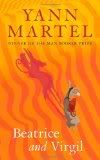
Monday, 7 June 2010
Game - Red Dead Redemption. Rockstar Games.
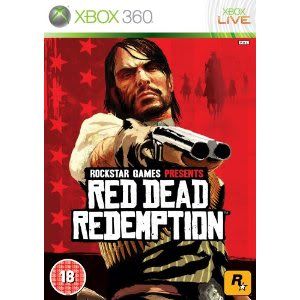 |
| Buy On Amazon. |
All the best games tap into the spirit of something and distil a quintessence of it that the collective psyche can sharpen its teeth on. A mighty unenviable task, you might imagine - to anticipate what a generation is thinking and build a hopeful empire around it. But that's what games used to do routinely. And it's not that mighty if you're God. Not too unenviable if you're Rockstar.
What do I mean? Well, how many of you have thought about growing your own veg lately? How about a herb garden, all legal like? A fruit tree or two? (or four, in my case). Fancied seeing a few chickens running around giving authentic soundbites to your sunny side ups?
Well sure, Roger Recession has had a hand in that. But we're all seeing the bigger picture coming into focus here; we're not daft. It's painted in the dying cries of corporate Stegosaurs, who, like their prehistoric parallels, grew to a super-sized mass but whose actual brains got no bigger, at the mortal cost of mobility. It's there too, line-drawn in the gluttony that concretised our cities, and that hinges now on a law of defaults and diminishing returns. The last crumbs of these slobber, as we speak, on the chins of feudal barons, who are managing to appear both servile and hateful as they beg for their livelihoods, promising greater restraint the way a crack addict does to a loved one between highs, or the way an oil company does to a government, while slurping up the last dregs of fossilised goo from the sea bed. Anxious, in the last days of its extinction, to waste not a drop, even if it means taking the world down with it.
We know this organically, instinctively, as one. We are already thinking obscurely of what it feels to live off the land, as our forefathers once did. We are certainly no happier, historians tell us, than they. Their hardships yielded leanness, backbone and long life, our plenitude brings obesity, back pain and early death. Some of us have already pulled soundlessly away from the urban herd and corralled ourselves onto rural plains, eschewing wealth. Growing produce. Keeping bees. Geocaching.
For those of you who haven't, here's a vehicle to act out that dream, pulling up alongside about now, a swarthy stranger at the reins. "Step inside, friend. Name's John Marston."
 |
| 'Taxi for Sundance?' |
Nevertheless, and to summarise a lengthy opening (that has said precisely zip about the gameplay yet, sorry) it seems that a mixture of foresight, digital largesse and geopolitical luck delineates certain games as classics. The sort that Deus Ex had, perhaps, or Half-Life. Self-aware riffs on the sum of all fears, exploring them up to and including their logical conclusion. But by taking off some of the rails and putting us at the helm of decision-making, they do so with an equal chance of compassion or dictatorship. And if you mess up, well that's your fault, pardner. Off the back of that acceptable trade, many games today offer the same choice. Fallout 3 does to perfection. Oblivion does, GTA4 does, and Red Dead Redemption does too, because control isn't necessarily just about where you point your spaceship any more.
So Red Dead's additional edge could well lie within the era it represents, a place of history we know is already gone, but one that we perhaps yearn obscurely for. We are, after all, the ultimate 'cake and eat it' generation; taught self-indulgence by parents who gave everything. But what have we missed out on, really - apart from going to war? What can they have possibly kept from us? Because this modern day stuff isn't all that. We've been there, Rockstar - haven't we? - and done that. Another contemporary city to play out a shallow turf war on would have been so passe and they knew it. They're not daft either.
So it's natural to begin with that same romantic view of the West that undoubtedly captivated its pioneers. Casual violence, rape, arson and cattle rustling are but ticks on a horse's hide, a dim awareness that someone, somewhere is getting their arse bitten, but not you, not yet. So you shade your eyes against the hot sun and admire, no - soak up - the view. It's still early days though, and no matter how much you love the vast, arid landscape of desert, punctuated by railroad, monolithic rock and dirt trail, your modern mind can't reference the empty spaces, and tries to fill them with skyscrapers and traffic lights. Coffee shops and Taco Bells.
 |
| Grab your theodolite, Marvin, I've found just the spot. |
In that cactus-filled gulch, where the bleached skulls of cattle gather is the perfect symbolic spot for a Macdonalds drive-thru, you think, then feel a bit sad about it. This isn't Sim City, you tit. But through some foible of the mind or similarity of game engine there's an afterimage of GTA4 you can't quite blink away, some clingy zeitgeist that needs to soften the desolation with its own superimpose-o-vision. You soon get over it, though, eventually, realising it's probably the lamentable ego crying for its mummy, just like it did when you first detached from the reptile. The last bits of dummy it spat when you gave up BUPA and Costco and the sanctuary of salary. You can never go back, it insists. But you can. You must.
You've an impressive physical scar or two, the sort that might have been symbolised in your other life by redundancy or repossession. A loved one's addiction to tanning booths and iPhones perhaps taking them into the arms of another, more capable supplier. You have known trauma then, but not outright ruin. You have seen hardships, but not starvation. You are self-serving, but altruistic. And so is John Marston.
You are struck by this unexpected resonance, convinced it can't just be coincidence. This has to be an extension of the way your life is unfolding of late, a prophecy of instruction. It nags at you, like deja vu, while you familiarise yourself with your horse, liking the way his flanks ripple and hamstrings tauten as you ride, gently at first, then the glisten and swell of his hide as you guide him - growing quietly confident - with flicks of the wrist, digging your bootheels to ramp up that easy trot into a clompy gallop. Let's see what you've got, Shergar. Then, a spur too far and he throws you off, and in that momentary dust-cloud of rage you draw your gun and shoot him right in his stupid head, then skin him, the tetchy hoofed cunt. No part of the animal is wasted; you can even sell his meat for profit. So once it dawns on you that all this teeming wildlife represents bunce and bounty, the romance kicks up a notch, albeit firmly into Tarantino territory, more steampunk than showboat. Hello, human nature. You took your time.
So your ride is dead and you're in the middle of nowhere but no matter, there's plenty of wild horses to be tamed and even a lasso to do it with, once you progress a little.
 |
| Must remember to keep hold of the rope this time. |
John, you find, is even more like you than you ever hoped or imagined. Time after time the bullets fly and the rabbit or the skunk or the deer or the crow or the dog or the chicken or the showgirl (oops, sorry Ma'am, done thought your boa was a real-life constrictor) fall down impressively, (the new Euphoria engine really showcases its talent here) for you to pluck bare, leaving no end of skinned cadavers shivering and fly-blown on the dusty plain. "Lie still," John says, as his knife splodges blood on the screen. And that's exactly what you'd have said too, with just the right touch of irony in the chuckle. You are soulmates and your journey together, you absolutely know for a fact, is going to be special.
And from here on in, the game never loses that quaint, almost somnolent vibe. Not in the cut scenes, which are tight and cinematic, not in the fights you are called on to break up, the honour of whores you are required to defend with unfailing regularity, the storekeepers' funds you are implored to reappropriate and offenders to vanquish, the various wild beasts you are compelled to fight off, most of which are completely fixated on the job of disembowelling your horse.
 |
| Cougars and rattlers and bears - oh my! |
All of this is underpinned by a swoony feel of High Plains Drifter meets Back to the Future III that you never once want to buy out of, especially when you enter Mexico and the haunting music rises with the hoofbeats, putting you more firmly in the saddle of a Sergio Leone movie score. It is achingly good. They've obviously watched a ton of westerns in the course of making this, and, if it doesn't exactly provide you with the catharsis you first anticipated (or had wistfully bestowed upon it) there's one thing that playing Red Dead leaves behind in your waking life, and that's the urge to watch a good western. Silverado, maybe, or The Good the Bad and the Ugly. Actually, I did watch that last one and it's shit.
Any issues that may have tainted the flow of GTA4 and its offshoots have been winkled out and refined to perfection. Whilst the shirt on its back is manifestly of GTA cheesecloth, it's had a good biological washboarding under a mountain stream, and all its creases ironed out through the mangle, which is nice. Not too many names on the map to shuttle between like human tumbleweed, so sets of missions tend to be grouped manageably between characters. Sub-quests from strangers neatly arrayed with progress bars, available through the menus. Sub games such as Liars Dice and Horseshoe all throwing some welcome gunslinger R&R into the mix. Texas Hold Em Poker is a particular fluid and addictive hook, with all the usual wry and repetitive soundbites we come to expect from the Rockstar NPC. "I saw mah boss - kiss a man!"
Other dalliances are there to take up your time, such as searching for scraps of outfits to wear when you piece them up, or the ubiquitous bounty hunt. Then, after you gain the lasso, a-wrangling we will go, hogtieing varmints and vagabonds alike, for extra 'alive' bounty cash. Sometimes a stranger accosts you for a shooting contest (as if you hadn't randomly slaughtered enough birds that day). Or he might simply take a dislike to your pissant face and challenge you to a duel.
So despite the distances between places and the lack of architectural features to fill them, (compared to, say, San Andreas or Vice City) there's never anything less than the feeling of an organic world, thriving studiously under the desert sun. There's an even greater sense of it in multiplayer, which offers a whole other picnic of 'free roam' within the game environment. With co-op missions and competitive missions such as Gold Rush and Grab the Bag, these are party games for the big kids, worthy of a separate review in themselves.
 |
| Paint your wagon. With lead. |
There are far more save opportunities now too. A property to rent or buy in every town, but even better - a camp you can buy and set up in the wilderness, where you can not only save your game and change your outfit but fast travel to a location of your choice. Checkpoints in missions so you don't have to start right from the beginning again. Keeping hold of your weapons and provisions once you die, thereby not penalising too heavily by simply putting you back at the last save point, essentially intact. The levelling up stuff and all the sub-games are a nice, highly-polished touch too.
There are some niggles though, as might be expected with a game of this sheer size and scope. Frame rate issues in places, random things disappearing from the screen. One mission bug had me trying to corral a herd of cattle into an enclosure whose gates steadfastly refused to open, another saw my body cartwheel around the hitching post every time I tried to secure my horse. But they are not gamebreakers, and the simplicity of restarting mid-mission eases the penury somewhat.
Overall, GTA4 with cowboy boots on, it may well be. But this game embodies all the spirit and fun of line dancing with none of the shame, unless, of course, you just shot your horse through the neck trying to down songbirds again.
Rating: 5 stars out of 5.
.
Sunday, 6 June 2010
Play - When Harry Met Sally - Opera House, Manchester.
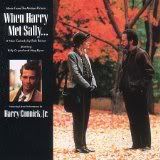 |
| Original Soundtrack - Buy from Amazon |
Saturday May 15th, 2010.
This stage revival of writer Nora Ephron’s 1989 movie classic is directed by Michael Gyngell, whose previous credits include (as Associate Director) Olivier Award-winning The Play What I Wrote. Sally is played by ex-Hollyoaks star Sarah Jayne Dunn, whose stage work encompasses the comedy Boeing-Boeing and The Vagina Monologues. Harry’s role is taken by Rupert Hill, no stranger to TV audiences as Mike Baldwin’s son Jamie in Coronation Street. He has built up a body of stage work too, most recently as Adrian in Deceptions. Supporting roles come from RSC actor Luke Rutherford as Jack, and Kosha Engler as Marie. American-born Engler was nominated for Best Actress in the 2009 MEN theatre awards for her portrayal of Carol in David Mamet’s Oleanna at the Bolton Octagon. The cast is completed by Callum McArdle (Joe/Ira) who is a graduate of the Guildford School of Acting and Annabelle Brown (Helen) an accomplished singer soloist and actor, appearing most recently in A Christmas Carol at the King’s Head (Mokitagrit).
Music comes from celebrated brothers Ben and Jamie Cullum with lighting and sets from Ben Cracknell and Tim McQuillen-Wright respectively.
This production marks a recent trend in translating big-screen classics to the stage, beginning with a West End production of The Shawshank Redemption last year and with Fatal Attraction rumoured for a theatre showing late in 2010. It is not difficult to see why this has been a straightforward choice for a similar treatment. The adaptor of Ephron’s original work for the stage, Marcy Kahan, in her programme espousal, quotes playwright Christopher Hampton’s definition of a theatre play as: “The slow unfurling of a tightly knit argument, powered by rhetoric, while a screenplay relies on the eloquence of its images.” The spoken word primarily drives this as a drama, she argues, and that’s why, “in its deepest impulses, it is really a stage play.”
No argument there, but how to convey to a theatre audience those iconic performances by Billy Crystal and Meg Ryan that will surely overshadow any well-meant re-enactment?
For those who have recently emerged from cryogenic stasis or are unfamiliar with the story, When Harry Met Sally spans a dozen years as two New Yorkers weave sporadically in and out of each others’ lives with a different aspect on their relationship each time they do. It takes place throughout the yuppie decade of the 1990s, culminating at the millennial eve of 1999.
The action is played out on a simple, multi-level stage with a backdrop image of the New York skyline. Set and costume changes are crisp and unobtrusive, driving the story forward with fluency and confidence.
As with the original film, the play’s success hinges on the chemistry between the leading pair. This will determine whether the audience believes their journey, from Harry’s disavowal of Sally’s belief that ‘men and women can be friends’ to the conclusion of that truth in a way that satisfies expectations of both genders. Hill and Dunn’s performance achieves that by some measure (with Hill’s New ‘Yoik’ brogue impeccably maintained) but the supporting roles of Jack and Marie add a considerable amount too, bolstering the process with their engaging portrayal of the ‘happy couple’, hitting it off, by contrast, entirely without complication.
From a script of this quality, sparkling with impish wit and cutting observation, the actors could almost be forgiven for ‘phoning in’ their performances. Happily, that isn’t a temptation succumbed to by any of the cast here. Even the relatively limited roles of Brown (Helen) and McArdle (Joe/Ira) are polished and fulsome. For the audience, laughs and spontaneous applause are never far away, particularly after Sarah-Jane Dunn’s expertly comic-timed orgasm-faking in ‘that’ scene. But the overall experience is so much more than that, capturing the same feel-good quality of the movie that lasts long after we’ve ‘had some of what she’s having’.
TV - White Girl (2009)
Bafta Award-winning drama from the BBC.
This powerful and socially compelling drama by Bafta award-winning writer Abi Morgan, examines a clash of cultures and influences when an impoverished white family relocates to an exclusively Asian community in Bradford. The story is told by a young girl, Leah, played by first-time actress Holly Kenny, and concerns her eventual awakening in this new and strange environment from the dissolute and feckless shadow of her mother, Debbie (Anna Maxwell Martin, of Bleak House fame).
The contrast of a white-trash estate in Leeds to the ordered routines of Asian-dominated Bradford could not be more marked for Leah, particularly as they appear underpinned by a hub of religious faith. In this light of majority reversal (she and her two siblings are the only white children in school) she feels at first threatened. "We're Roman Catholic, we want our own assembly, otherwise it's racist." Then, as she makes friends with neighbour child Yasmin, becoming conscious of the complete lack of urban strife in their community, she warms to their ideals, eventually pursuing them as a just alternative to the moral laxity and feral nature of her own role models. There is a lot of crisp-eating and mattresses on the floors of Leah's house to buttress this justification, which makes her solace in a 'borrowed' children's version of the Koran plausible. It seems to express the missing things in her life as an ideological fairy-tale, the reality of which comes strongly to life when visiting a mosque for the first time with Yasmin.
After she begins sporting a fetching blue hijab, however, the issue becomes a main area of conflict. Debbie reacts with sudden and new-found maternal vehemence. Leah has been a surrogate mother to her siblings and neglects this duty as she spends more time in Yasmin's household. When step-father, Stevie, played by Daniel Mays, returns on the scene, the role of drug mule is passed to her young brother, Adam, admittedly in the innocence of his mother, and this, coupled with Leah's mould-breaking strive, appears a pivotal decision for Debbie in finding the strength to finally banish him, appropriately enough, with the mantra, 'I divorce thee' three times. The quickest of Muslim quickies; Reno, eat your heart out.
In summary the propagandist message is certainly overdone, the conclusion a little too neat and tidy and some of the juxtapositions tenuous (it's hard to believe that Yasmin's father would escape a brick through the window or a querying police visit for his studious harbouring of Leah). Abi Morgan's bold and instinctive writing is the Araldite of these precepts, however, preventing them from ungluing on us like so much sub-continental furniture.
There is often humour among the grit too, as Leah demonstrates early on. "199 names for the prophet Mohammed, was he fiddling his benefit too?" The cast upholds this sense of quality with brilliant and believable performances, even if Ms. Maxwell-Martin's syntactical posh does slip out on occasion.
Ultimately, the whole package is a crowd-pleaser, drawn carefully between the lines of Koran proponents and Daily Mail prophets of social decline. Where its mass appeal lies, however, is for armchair aficionados of intensely powerful drama everywhere, who may or may not care for sub-textual love notes.
Play - A Midsummer Night's Dream - Octagon Theatre, Bolton.
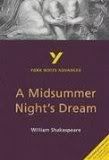
A Useful Study Guide. Buy from Amazon (click on Pic)
A Midsummer Night's Dream - Octagon Theatre, Bolton. Monday 23rd February 2010.
Away With The Fairies.
This version of Shakespeare's original work is performed in its entirety and comes in at around 3hrs 20mins with interval and runs until 6th March. The cast is a mixture of local, established and fledgling talent. Rob Edwards and Paula Jennings appear as Theseus/Oberon and Hippolyta/Titania respectively. Octagon regulars Vanessa Kirby (Helena) and Russell Richardson (Egeus/Snug/Fairy Colonel) support, alongside RADA-trained Rosie Jones (Hermia) who makes her professional stage debut. Other key performances come from Jake Norton (Demetrius) and Kieran Hill (Nick Bottom).
Thacker's directorial vision is one of pursuit and romantic abandon in a 1960s 'Summer of Love' heat-haze. This is well supported by visuals and costumes from set designer Ashley Shairp, although these hints appear distinctly lacking at first as the courtiers open on a minimized thrust stage. Here, military uniforms convey an air of ceremony, accented by Rob Edward's (Theseus) incidental likeness to a minor golfing royal. This opening scene is dominated by a huge, curtained backdrop of the Athenian warlord in full-on propaganda pose. The image has a modern parallel, that of Greek radicals subverting legislative change to seize their military dictatorship of the late 60s. In the absence of that subtle knowledge, however, you may be forgiven for an expectation of dour visuals.
These fears are quickly negated when the stage opens fully to a riot of colour. Circular motifs and furnishings reek of sixties culture. Inflated spheres stippled with woodland texture litter the floor, large and small. Raised Chinese lanterns and a grassy hummock are foreshadowed by balcony steps leading up to Titania's impressive bower; an inverted dome that perhaps a young Terence Conran may once have plumped for in lieu of a love seat. The fairy costumes provide a vital impetus of 60s whimsy too, with Titania's white boots and maxi-dress a particular feature.
Lighting (Wayne Dowdeswell) completes the forestal impression with hints of shimmering leaves, filtered by fragile sunlight. Jimi Hendrix might easily have slept off a purple haze or two here back in the day. Finally, dry ice offers smoky ephemera without being overdone. The music of Carol Sloman, played from an attentive stage-side trio, is sturdy and mellifluous throughout, although I have to express personal disappointment at the omission of a jazz flute.
Ultimately, the theme works well, lending a sense of place and pace to the prosaic flow. Indeed, these disparate eras become more relevant to each other by progression, as does the twinning of roles, which is circular and unifying. Although not a tactic new to this play, the drab serge of Theseus complements the vibrancy of his fairy counterpart (and supposed alter ego), Oberon, as does Hippolyta's to Titania. Additionally, the design memes of altered consciousness are consistent with the myriad 'druggings' that follow, while the 'mechanicals' manage to steal the show at the end with their wonderfully painful rendition of Thisbe and Pyramus. Overall, perhaps not one for purists, but for others, a quirky rendition with an infectious style owing much to its word-perfect cast and their ability to navigate lengthy prose and oversized beach-balls with equal aplomb.
Book (Poetry) - The World's Wife. Carol Ann Duffy.
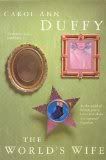 |
| Buy From Amazon |
The World’s Wife – By Carol Ann Duffy.
Rating: 3 stars out of 5
There is some wonderful evocation of imagery too, appropriate to the subject matter. In ‘Mrs. Lazarus’: “I heard his mother’s crazy song. I breathed / His stench; my bridegroom in his rotting shroud / Moist and dishevelled from the grave’s slack chew.”
But then there are a few poems that drift into territories of a personal bent. Their explicitness, however heartfelt, probably belongs elsewhere if we are to see a consistent train of ideas and characters emerge. These are poems of a different flesh, shoe-horned to the purpose in hand, one feels. In ‘Mrs. Tiresias’, for example, although Duffy is validly withering of the male aspect when confronted with female hardships, she can’t quite resist dropping in a pert fantasy of her own:
“and this is my lover, I said
[..] and watched the way he stared
At her violet eyes
At the blaze of her skin
At the slow caress of her hand on the back of my neck
And saw him picture
Her bite
Her bite at the fruit of my lips
And hear
My red wet cry in the night.”
The poems themselves are scattered liberally throughout without apparent order, caustic railing followed by existential wailing followed by breezy, bar-room banter. Thankfully, there are many more of the latter and the supporting idea is all the better served by it. These wifely stories always relate better with sarky, hindsight voices, suffused with a wink-wink knowledge of their purpose, to show us how it should have been done, or why it was done so well, a whisper from behind the hand of the great woman behind every so-called great man. Or, as the old joke goes: ‘For sale, complete set of Encyclopedia Brittanica. Just got married. Wife knows everything.’
In summary, the intent behind the collection is entertaining, thoughtful and well served. The wit and lightness of this anthology does become occasionally tainted by Duffy’s personality though, which would be fine in a work tasked for that purpose. Here though, if feels like the poetic equivalent of author intrusion. Were Duffy not Laureate, not lesbian, this might be an invisible detail. Unfortunately or otherwise, because of those things, in a very few places, it is not.
Book (Fiction) - A Kind of Intimacy, Jenn Ashworth.
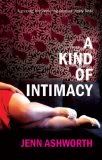 |
| Buy from Amazon |
Jenn Ashworth’s debut novel is a gluttonous, darkly comic fry-up with a congealed aftermath, leaving far worse than egg on her protagonist’s chins.
Rating: 3 stars out of 5
Annie, the unreliable narrator of this disturbing suburban grimoire combines the most shrewish and least desirable qualities in us all, except in her case there is arguably no counterbalance, no seed of redemption within the nettles of her personality. She is, it’s fair to say, a big fat Yang with no noticeable Yin. Whereas we might occasionally be mendacious but are kind to old people, she is not. Where we may ourselves scheme, twitch curtains, prowl, bear grudges, be sporadically deceitful and harbour notions of self-delusion in any combination, they tend to be things of the moment, mollified by some greater good. Hers aren’t.
Annie is both complex and childish, and even if this makes the things she does plausible, it is tempting to brand her rage-driven character and motives contrived. Jealousy, unrequited love, and retribution are foisted in turn, principally upon her new neighbours, placid Neil and his young fiery wife, Lucy. When she decides, after a rudely short time, that Neil is perfect for her and Lucy is holding him back, it proves a sublime, if squeamish taster for the fantasy banquet to follow. A delve into her less than idyllic past soon divests us of any notions of unoriginality, with unpalatable incursions into abuse, murder, and even a salacious involvement in the ‘fat porn’ industry.
It is Annie’s voice that is the key to credibility here, because she doesn’t see herself as a human repository of negative ills, just as we so often fail to acknowledge our own shortcomings. She relates them casually, conversationally, turning her most heinous flaws into fallible traits or justified actions. At the conclusion of an excruciating attempt at a housewarming, where she polishes off a whole tray of fairy cakes and two bottles of wine after the guests leave, then spends the next day vomiting and singing in a nightdress stupor, she explains her behaviour as: “An adolescent outpouring of youthful enthusiasm… cut short by my early marriage.”
With the invention of a daughter for the benefit of her new neighbours (arising, we assume, from the fruits of that early marriage, the true disastrousness of which we will eventually come to witness) she then spends a third of the book unconvincingly warding off questions concerning the child’s lack of visibility. It makes for a scummy layer of discomfort we can wince awkwardly at, like a pie-crust apprehensively cracked, its gray stew of plot cringing beneath, waiting to be savoured, or not.
You might be tempted to push your plate away from such stodgy fare, or to pick over the best bits, defaulting on the tasteless. Jenn Ashworth has not set out to sate us with choice cuts, though, but with clumps of noxious greens and arterial meat, sauced over with lashings of seediness and intrigue. Certainly, it is raw in places, where the fat-worshipper oversteps the mark, for example. “He raised his hand and slapped me across one eye, then the other. My teeth clicked against my tongue, my mouth filled with salt and my nose started bleeding.” Overcooked in others, especially in the limitless quotes from Annie’s self-help books which long outlive their character-defining usefulness.
Ultimately, though, the novel succeeds from its sheer number and variety of courses - all, you come to realise, suspiciously tainted in some way, testing even the strongest of appetites. Regardless of how marginally you empathise with Annie, one thing is certain: just when you think she can’t slurp up any more degradation, the plate is licked clean before you.
Subscribe to:
Comments (Atom)
Amazon Search
Blog Archive
-
▼
2010
(8)
-
▼
June
(8)
- Book (Fiction) - A Dark Matter, Peter Straub.
- Book (Fiction) - A Life of Pi. Yann Martel
- Game - Red Dead Redemption. Rockstar Games.
- Play - When Harry Met Sally - Opera House, Manches...
- TV - White Girl (2009)
- Play - A Midsummer Night's Dream - Octagon Theatre...
- Book (Poetry) - The World's Wife. Carol Ann Duffy.
- Book (Fiction) - A Kind of Intimacy, Jenn Ashworth.
-
▼
June
(8)
About Me

- Tony Foster
- Manchester, England, United Kingdom
- Writer, Father, student, career procrastinator.






